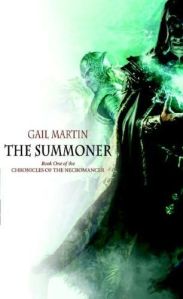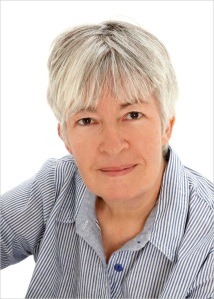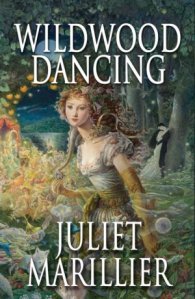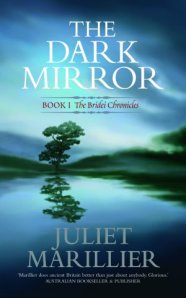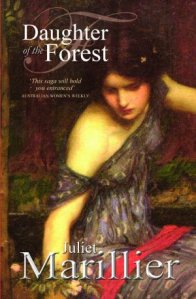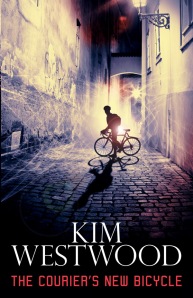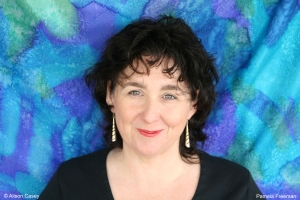Announcement: Erica has just signed a 2 book contract for an urban fantasy duology with Berkley US. Congratulations!
As the next of my series featuring fantastic female fantasy authors (see disclaimer) I’ve invited the talented Erica Hayes to drop by.
Watch out for the give-away question at the end of the interview.
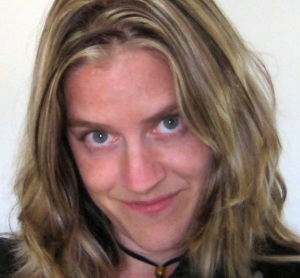
Q: Book one of The Shadowfae Chronicles came out in 2009. This series is set in Melbourne. Did you ever consider it might be too risky? Were you tempted to set it in a generic US or British city? (Read the first chapter here).
No, not for this one. I really wanted to set the series in a city I knew. And the idea for the warring demon factions in the Shadowfae underworld came from the real-life gang shenanigans in Melbourne, so it seemed only right to leave it there. Neither my agent nor my editor ever asked me to change it, and to my knowledge no one who passed on it did so because of the non-American setting (plenty of other reasons, but setting wasn’t it!)
I wouldn’t say it’s a complete myth that American contemporary fantasy publishers don’t want exotic settings – it’s clear from the evidence of what’s on the shelves that they’re more comfortable with places they believe their readership will find familiar. And hey, most of their writers are American, and they’re writing what they know, same as I am, so American settings are to be expected. But I think if you can make the setting fresh and exciting, and so integral to the story that changing it would lose the flavour, it really doesn’t matter where the action takes place.
In my books, the scene-setting is extra important, because there’s so much sensory detail. I want readers to feel like they’re there, immersed in the sounds and smells and tastes. And I think that’s what you’ve got to do, no matter if it’s America or Australia or darkest Africa.
Q: The second book of the series, Shadowglass came out in March 2010. (Read the first chapter here). You describe your main character, Ice, as ‘a geeky little fairy girl who wants to be someone else. Anyone else. She doesn’t really care who, so long as it isn’t her own clumsy, tongue-tied self. Sure, she’s got a career, sort of, if you count ‘diamond thief’ as a job. She’s got a pair of crazy fairy friends who’d do anything for her. Life’s not so bad, even if it’s a nasty fairy-hating world out there.’ Do you find your characters spring into your mind fully formed or do you consciously build them?
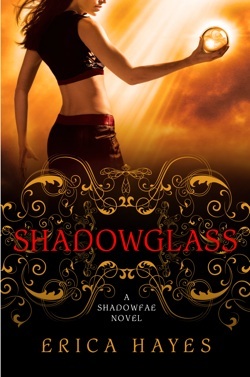 Usually they spring to mind in cartoon form, if you like – kind of a line-drawing caricature of themselves, with a few defining characteristics. But I do a lot of work after that, to build their backstory and make sure they’re believable.
Usually they spring to mind in cartoon form, if you like – kind of a line-drawing caricature of themselves, with a few defining characteristics. But I do a lot of work after that, to build their backstory and make sure they’re believable.
Ice, for instance, I immediately knew was a geeky fairy girl who steals for a living. But the wanting to be someone else came later. Thing was, I’d never anticipated writing about a main character who was a fairy, and I’d spent the first book in the series showing fairies as these wild party creatures who live fast, die young and never have a plan beyond whatever feels good at the time. Not a good motivation for a main character!
But I couldn’t contradict myself by making her a driven career girl or something. So petty thief Ice is wild and fun-loving and careless, yes, but she has this secret longing for something more, and she’s desperately in love-at-a-distance with her idol, Indigo, who’s a big-time thief and everything she both wants and wants to be. Of course, it’s that yearning that gets her into trouble. With demons, and possessed magic mirrors, and lovesick serial killers. Oyy.
Q: And six months later book three, Poison Kissed, came out. (Read the first chapter here). Were you madly scrambling to write these books to deadlines or had you written several before the first one was accepted?
 I’d written two when I sold SHADOWFAE in a two-book contract. But that second manuscript still hasn’t been published – I wrote them a whole new book 2, SHADOWGLASS. That was an interesting experience. I’d never written to a deadline before, and when I told them, ‘sure, six months is no problem!’ I had no idea who or what SHADOWGLASS would be about. I had to ignore my already-written book 2 and reconsider how the series would proceed. But the editor said ‘fairies, please!’ so I said, ‘sure’, and thrashed it about until I came up with something.
I’d written two when I sold SHADOWFAE in a two-book contract. But that second manuscript still hasn’t been published – I wrote them a whole new book 2, SHADOWGLASS. That was an interesting experience. I’d never written to a deadline before, and when I told them, ‘sure, six months is no problem!’ I had no idea who or what SHADOWGLASS would be about. I had to ignore my already-written book 2 and reconsider how the series would proceed. But the editor said ‘fairies, please!’ so I said, ‘sure’, and thrashed it about until I came up with something.
Luckily, I discovered that six months is a comfortable timeline for me. The books are around 100K (except book 1, which is very short, though no one seems to have noticed!) so I spend around six weeks outlining and getting the story right, three months or so writing, and the rest of the time doing a few quick revisions before I submit.
My agent isn’t the kind who asks for revisions from the get-go, so we typically send the MS straight to the editor when I’m done. My own revisions are mostly tweaking the character arcs so the romantic development is just right. And trimming: the manuscripts are invariably too long, and because I’ve outlined them until my eyes bleed, I can’t usually cut anything substantial. So I have to lose words by trimming the writing. That gets harder as I get more experienced and my first drafts get tighter, and because these books are intended to be written in a lush and textured style. But I find I can still lose 5% to 10% pretty comfortably. It’s just a matter of ruthlessness!
Oh, and that not-published ex-book 2? Genie meets zombie cat-burglar. That’s all I’m saying…
Q: And book four, Blood Cursed, is being released in August 2011. (Read first chapter here). Have you found that releasing the books 6 months apart has created momentum for the series?
 I don’t know. I hope so! But six months is pretty standard for paranormal romance. These days some series are doing back-to-back releases, with books released every month – now that’s momentum!
I don’t know. I hope so! But six months is pretty standard for paranormal romance. These days some series are doing back-to-back releases, with books released every month – now that’s momentum!
Still, if books aren’t working for readers, I don’t think a quick release schedule can save them – and if readers love a series, history shows they’re willing to wait. The danger used to be that if you waited too long to publish again, readers would have forgotten about the earlier books, with no chance of a recap because the paperbacks had already disappeared from bookstore shelves. But now, with e-books, the earlier books are ‘in print’ – and visible to readers – for a lot longer, maybe forever. So I’m not sure that release schedules are going to be such a factor in the future.
Q: Each of these books revolves around a mystery. Are you a closet mystery fan?
I never really looked at it that way 🙂 I suppose they are mysteries of a sort! Jade in SHADOWFAE has to hunt down four damned souls, and Mina in POISON KISSED is searching for her mother’s murderer. But it’s basically just to give the characters something to panic about while the romance happens! And the solution to the mystery is always a kick in the face for the heroine as far as the romance is concerned. The plot serves the romance, not the other way around.
I do like mysteries on TV – the gritty British police procedural kind, usually, like Wire in the Blood or Cracker or the new reboot of Sherlock. I love Doctor Who, and he solves mysteries. But I’m not sure I could ever write a procedural – they’re too clever!
Q: Is your next book going to be number five of The Shadowfae Chronicles or are you branching out? Tell us what’s in store.
I’ve got a Shadowfae short story, CHERRY KISSES, coming out in an anthology called HEX SYMBOLS from St Martin’s Press at some stage soon. It’s about a new character, a witchy con artist called Lena. But at the moment, I’m working on other things. I’ve written a space opera, and a dark paranormal romance set in a world that’s not the Shadowfae world, so I’m looking at publishing options for those. And I’m toying with some urban fantasy ideas. A surfeit of new ideas, in fact!
Q: I was prompted to start this series of interviews because there seems to be a perception in the US and the UK that fantasy is a bit of a boy’s club. Do you think there’s a difference in the way males and females write fantasy?
Yeah. That’s the short answer.
What, you want the long answer? So glad you asked 🙂 The ‘big thing’ in fantasy books in America at the moment is obviously urban fantasy and paranormal romance. Not too hard to guess which side of that fence most male authors fall. Female authors – at least the published ones – seem to be willing to include a lot more romance in their books, and to focus on relationships over action. Is it because they have to in order to get published and gain a large readership, seeing as the romance genre is so dominant and it’s what publishers want – or because female writers naturally lean that way and male writers don’t?
I don’t know for sure, but it sure is interesting to note that the biggest thing in fantasy television right now is the old-fashioned antithesis of lone-wolf, kick-ass-chick urban fantasy: Game of Thrones, based on books written by a man, with male screenwriters and a heavily male-dominated cast – except for the most powerful villain, who’s a woman.
I don’t mean these are bad things – I adore Game of Thrones, both the show and the books! And the show does have other strong and important female characters, which is impressive, considering it’s set in a fantasy society that’s dominated by men. But it’s interesting to see what’s required – or what the networks think is required, and in the case of Game of Thrones at least, it worked big-time – for a fantasy show to gain large mainstream popularity. Part of which, apparently, is that the male cast I mentioned is populated with some of the sexiest actors on the planet 🙂
I mean, it’s TV Land, so everyone’s hot, right? And sex always sells, no matter the genre. But part of me suspects that someone at HBO thinks female viewers only watch fantasy for the hot guys – and that’s kind of borne out by the popularity of paranormal romance, right?
Exhibit B: True Blood, another HBO show that I also love, in a surreptitious, guilty-pleasure fashion… A female-written fantasy (Charlaine Harris) seen through the thoroughly male lenses of the show’s creator, Alan Ball. The result: soft porn, or as I saw it described on a comic book website, ‘a show that’s almost entirely about Rogue’s tits’ 🙂 HBO thought they’d get more viewers if the show was more about sex and violence than about fantasy. Which supports the theory that writers put romance in their fantasy books because it’s what the publishers want. What it doesn’t explain is why more male authors don’t do it. So perhaps some innate difference in the way the genders write fantasy is a real factor – it makes sense that we’d all write what we want to read, after all.
Another example is Supernatural, which began as a monster-of-the-week action series (remember season 1?) until, IMO, the network figured out pretty quickly who the majority of their viewers were (women and teenage girls) and turned it into a bromance, because “hell, women want stories about relationships, right? Look at all those romances they read!” As a result, Sam and Dean Winchester are maybe the hottest on-again, off-again couple on TV. Whether this is ‘what women really want’ or not, would Supernatural would be the hit it is today if Sam and Dean weren’t such handsome young things, and if they weren’t so desperately ‘in love’?
Anyway. I’m speculating. I don’t have any facts here. And anything that gets fantasy and/or romance onto the screen is golden with me! But I’d love to know the gender breakdown of viewers for Game of Thrones and True Blood, compared to that of the books’ readership. And how many straight boys watch Supernatural 🙂
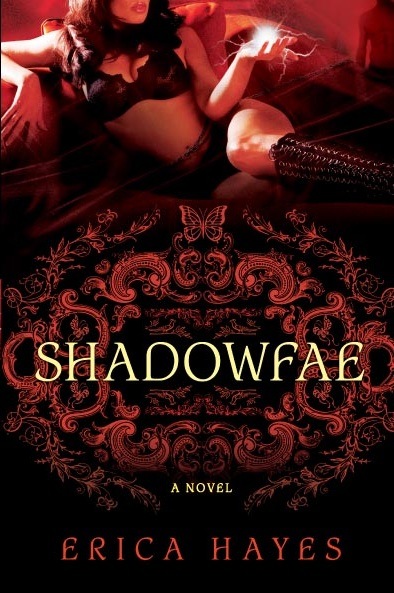 Q: Following on from that, does the gender of the writer change your expectations when you pick up their book?
Q: Following on from that, does the gender of the writer change your expectations when you pick up their book?
Umm. Maybe. I know I’m always interested when I see a new urban fantasy book written by a man, just because they’re so rare. I suppose I’d be surprised if I discovered that such a book had a strong romance plot, as opposed to little love-interest subplots. And I think for some reason, I expect more humour and less angst from a male UF writer. This is probably Harry Dresden’s fault.
So is that a yes? I guess it is! Remembering that I’m coming at it from the paranormal romance/urban fantasy corner. If you’re talking about the more epic-style fantasy, probably not so much.
Q: And here’s the fun question. If you could book a trip on a time machine, where and when would you go, and why?
Ooh, that’s a toughie. Backwards or forwards? If backwards, I’ll cling to my desperately romantic view of history and ignore the fact that my feeble 21st century immune system would probably swiftly succumb to smallpox or some horrible rotting fever and I’d die screaming… maybe Imperial Rome? I’d love to see if it’s the way we imagine it.
Or forwards? Yeah, that’d be cool. I want to ride on an interstellar spaceship at faster than the speed of light 🙂 And see the future Galactic Empire, complete with fake gravity and Death Stars.
Give-away Question: Erica likes the idea of a time machine, so where-when would you go and why?
Follow Erica on Twitter: @ericahayes
Erica Hayes on Facebook.
Catch up with Erica on GoodReads.
See Erica’s blog.





